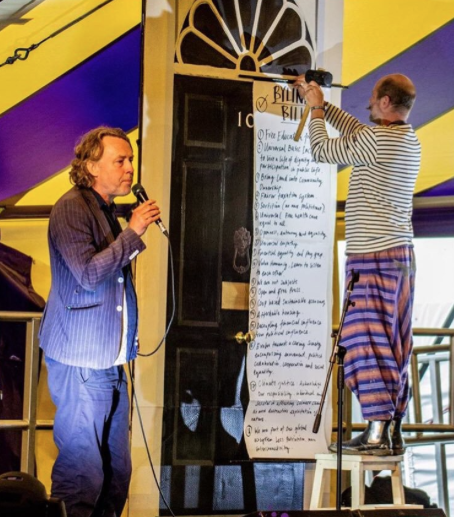Alternative Editorial: Ambition Worth Pursuing
In the opening scenes of BBC’s new TV drama Years and Years, the Emma Thompson character, Vivienne Rook – celebrity turned populist politician – provokes a fictional Question Time audience with the challenge: “why don’t we have more ambition”? We’re not privy to what form that will take in the coming episodes, but her question stayed with us this week.
Maybe because we heard Nigel Farage use the same taunt in a recent stump speech, during the launch of the Brexit Party.
Farage, like Trump in the USA, has always roused crowds by pointing at years of humiliation - and then promising deliverance from it. Although within his speeches, there is always a curious mix of withdrawing from ambition and pursuing it.
In his first speech in Europe after the UK referendum which resulted in 52% voting to leave, he said “The little people rejected big politics and said, ‘we want our country back. We want our borders back, we want our fishing back. We want to be an independent normal nation’.” But then, he continued: “give us a continued tariff-free deal on cars and allow us to go off and pursue our global ambitions for the future”.
In the recent launch of Farage's new Brexit party, there is a similar pull and push. On the one hand, he recognises that “politics is broken” and “the task is to change politics for good”. It has to be a “democratic revolution”, because the people deserve better. On the other hand, there’s no detail whatsoever on what that means, no manifesto and no other policies. No suggestion of how voters around the country might begin to participate in politics in new ways. Or how MPs will be more accountable. As if all that is irrelevant to democracy.
Instead, in the party he has just founded, there is no formal decision-making structure. Farage himself “has high level control over decision making, including hand-picking candidates himself”.
In another anomaly, the Brexit Party demands that Britain leaves the EU, but makes leaving synonymous with a No-Deal, done on the default trading terms of the World Trade Organisation: something that voters never had an option to choose.
And yet, there is no denying that the call for ‘more democracy’ and ‘more ambition’ are hitting home. Despite the lack of substance, Farage continues to attract crowds of thousands wherever he speaks and the polls are predicting huge success for the Brexit Party in the European Elections on May 23rd.
It’s the very stuff of populism – emotional appeals that hit upon the long-standing needs of people, irrespective of whether or not there is a capacity to deliver on what is offered.
But what if people did have a chance to properly consider what a better democracy would look like? And alongside that, what kind of ambitious programme might be followed, if they could trust that democracy to deliver?
Getting to a more democratic culture
While all our current political parties would claim to uphold democracy, none go beyond what Audrey Tang in Taiwan describes as ‘entry-level’ democracy – meaning voting once every four or five years (see our previous coverage on Tang). Westminster elections are limited even further, where we vote in a first past the post system that upholds the dominance of a two-party system. According to Make Votes Matter, the campaign for proportional representation, as much as 57% of our votes are wasted by this method.
In Scotland, where a proportional system is used to elect the Parliament, there is a more subtle balance of power. Consequently, the smaller Scottish Green Party has real weight – it often holds the largest Scottish National Party to account, over environmental and local democracy issues in particular, when it comes to them approving the annual government budget at Holyrood.
Many in Scotland, pre-eminently Common Weal but also others, are proposing a Citizens Assembly to replace the second chamber – whereby a short term, random selection of citizens (known as sortition) would have the chance to deliberate big policy issues over time and make recommendations for legislation to government.
Birgitta Jonsdottir of the Pirate Party in Iceland who championed a nationwide People’s Constitutional Assembly.
Yet in a media landscape in which every politician claims to know ‘what the people want’, there are no mechanisms at all to capture that accurately. In Taiwan, people vote several times a week with a digital system that has transformed the role of citizenship and given people genuine agency in the future of their country.
Not only has this given them a sense of autonomy that was hard to imagine for a country that China prefers to think of as a colony. But it has also freed Taiwan to break away from the broader patterns of development in the region. Just yesterday, Taiwan became the first country in the whole of Asia to legalise same-sex marriage.
Are we ready for a move into digital or (as it’s sometimes termed) liquid democracy? There is an argument that the Taiwanese, with their long history of Confucian culture (ref), are predisposed to think about the good of society before their individual needs and wants. In this context, fast and frequent decision making may be less fractious and antagonistic in Taiwan than the UK. Both the Scottish Independence and EU membership referenda have left lasting social divisions.
Jamie Kelsey-Fry leads a People’s Assembly at the Byline Festival 2018
But what about all the other possibilities? Extinction Rebellion are amongst a number of social movements now calling for regular People’s Assemblies – in person, community gatherings where people can propose ideas, nominate ‘responsibles’ and vote in carefully facilitated environments. This kind of local decision-making can be effective especially if connected to independent councils who are up for participatory budgeting.
And not all voting has to be binding. It is also possible to generate a more democratic culture through consultative voting, so that community leaders – and the people themselves – can get a sense of what they want. While Talk Shops and Thinking Boxes are very helpful in testing the temperature around policy ideas, new forms of gathering and developing individual and collective agency are appearing all the time.
But rather than respond to government agendas that are still being shaped by the 2% discourse, what new could a radically enhanced local democracy give rise to? What would count as ambition in the worlds of citizens less in thrall to national agendas? Less constrained by the lobbyists of the growth economy?
Yes we can CAN: collaboratories and citizen action networks
In the collaboratories we have held in different parts of the country the priorities for community development have included the call for safer, more resilient but also more friendly spaces to come together better. The need for belonging and relationship sits alongside the desire for more control: for example in Eastbourne where loneliness was voted the most important problem to tackle.
There is no doubt also that a drive for more local decision making is coming directly from a desire to tackle climate breakdown in the face of government failure. In some ways, that drive has been slowly building below the radar of political parties for decades. And the urgent need to connect more people to the solutions on offer is the ambition of the Citizen Action Networks.
But there is something else that arises when people gather, in a friendly, responsible way: their growing trust and relationship begins to evoke a deeper longing for the kind of life our politics rarely describes. Not simply one described by material necessities, but articulated through values being upheld and emotional needs getting met.
This is the desire for ‘feeling noticed’ or recognised, for being ‘in control of your life’, for having enough privacy alongside all our abundant modern connection. In some cases, the desire for more friendship and intimacy is linked directly to more time. Freedom in particular is a word that evokes great longing in rooms of people who have felt so restricted by their work patterns and lack of resources most of their lives.
This is where a populist agenda can easily harness the energies of communities ‘left behind’ - not getting their share of attention and resources from Westminster. But unless there is consideration and mechanisms put in place to link that unrest to some form of local and regional agency, emotions are only being triggered to cause unrest and harvest votes. It’s the worst of our dysfunctional political culture, only deepening the cause for complaint.
The South / Devon, Plymouth Inquiry 2018
But there is an alternative. In stage two of our collaboratories – the Inquiry - we invite participants to use their imagination to design a future they can look forward to. Using artists and performers, we explore our personal and shared sense of what is possible – beyond what is already on offer.
This is not only the all -important challenge of getting down to zero carbon and back to bio-diversity over the next ten years – in which there are some thrilling breakthroughs on offer. Both from around the world and from the next town along from where you’re standing.
But it’s also about new life-styles: new ways of working, new ways of experiencing community, new ways of being more fully human. Some have been inspired by local social enterprise, others by technology breakthroughs or the liberations from routine labour promised by artificial intelligence and robotization.
At A/UK, we’ve had practical suggestions for job-sharing; differently structured working weeks; new local currencies; new methods of distributing food and energy; different means of cheap and free transport.
And as a result of these open inquiries, we’ve seen congenial spaces for gathering emerge in unexpected locations. From Tea with Strangers to Death Cafes to Maker Spaces and Repair Cafes. Where people are not afraid to talk about their inner lives alongside their outer ways of appearing and doing. Here, they both face their fears about the future, but also plot how to build capacity, find strength, connect with their world in unprecedented ways.
But most importantly, a common dream begins to arise. It’s rarely illustrated by expensive items – the stuff that is dangled before us in magazines and adverts. Or by victories over others, in battles with anonymous tribes. It’s mostly characterised by a sense of friendly flourishing – of their collective space, both natural and urban. And by relationship – both internally within the community but also outwards towards the world.
That dream then becomes the concrete ambition of the Citizen Action Networks (CANs), which follow on as the next stage in the design process of our Collaboratories. These CANs concretely connect innovators and civil society actors with each other and with skills and funding resources, to collaborate on delivering what the people are choosing. CANs offer all forms of participation and belonging to people right across the community, irrespective of old tribes.
So next time you hear a politician call for a collective show of ‘ambition’ – for the people, for the country – make sure to ask them for some details about how that will show up in a town near you. Don’t settle for some empty rhetoric. Hold out for the real thing.
For more information on how to start a collaboratory, contact info@thealternative.org.uk.





